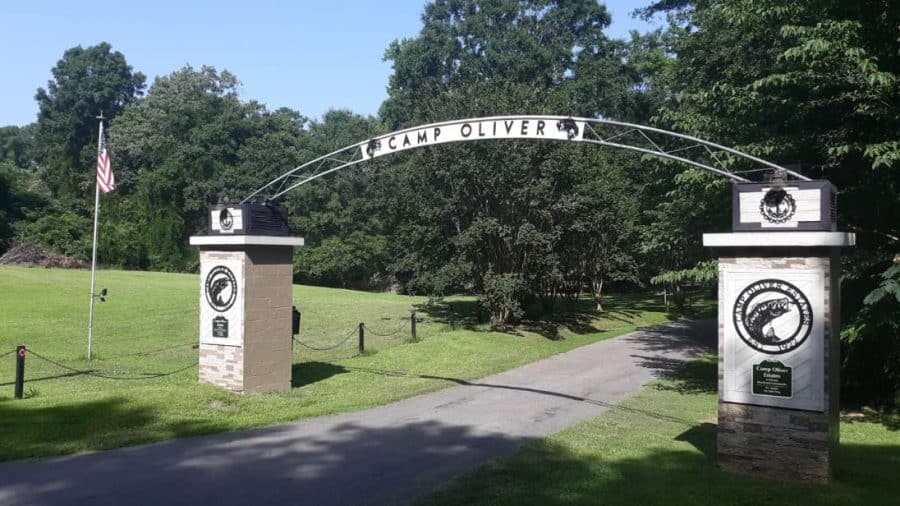The Alabama Fisherman’s and Hunters’ Association celebrates 100 years along the Black Warrior River
June 29, 2022
2022 is a year of milestones for Alabama waterways. This year marks the 50th anniversary of the passage of the Clean Water Act, a landmark piece of legislation aimed at protecting America’s waters, as well as the 20th anniversary of the Black Warrior Riverkeeper, a nonprofit organization dedicated to maintaining the health of the Black Warrior River watershed.
2022 is also a milestone year for another organization: The Alabama Fisherman’s and Hunters’ Association is commemorating its 100th anniversary this year. As we celebrate milestones in water advocacy, it’s important to pay attention to stories of resilience.
Sherman Engler, the immediate former president of the Alabama Fisherman’s and Hunters’ Association, lives along the Black Warrior River near the headquarters of the Association. Engler’s home is at Camp Oliver, which is nestled along a gentle slope near a wooded area on the border of Jefferson and Walker Counties.
“Our organization was really founded by early sportsmen, who wanted a place to fish and hunt and not have any abuse of the river or waterways,” Engler said. The organization has sought to continue that mission ever since by advocating for waterways across Alabama.
Founded in 1922, the group got its start in northern Jefferson County. Engler said the namesake of the camp on which he lives is William Oliver, a businessman from Birmingham, who fished regularly at Shades Creek. After discovering that fish in the creek were being killed by dynamite, he petitioned the city of Birmingham and the state of Alabama to stop the harm.
“There was really no conservation effort, or anything done in terms of keeping the variety of fish and numbers of fish in a consistent manner,” Engler said.
Realizing that someone had to act, Oliver formed a political group to advocate for new laws. So, Oliver founded the Jefferson Fishermen and Hunters’ Association and began lobbying for new conservation laws, which eventually passed.
At that point, Engler said, the group became the Alabama Fisherman’s and Hunters’ Association that exists today. The group purchased 90 acres of property along the Black Warrior River, raising money by selling $5 bonds.
After the purchase, the group built bunkhouses and a kitchen. Dorms from a nearby World War I hospital were also moved onto the property, and for $2 a year, members could fish on the premises.
By 1925, there were over 800 members. Engler said this spot was perfect for the camp, as the location already attracted lots of traffic. The nearby farming communities meant the area was already populated, and the ferry that once ran across the river provided them with transportation.
The growth of the organization slowed in the 1940s during World War II, but they would face another challenge. The state of Alabama was exploring the idea of building a dam downstream to extend the port system above the city of Northport. Completed in 1947, the port system ran all the way to Birmingport in Jefferson County.
As a result, water levels at Camp Oliver rose and claimed over half of the original property. When the waters rose, Engler said the organization decided to split Camp Oliver into lots for purchase by families who wanted to live in the area year-round. Most families only came to the area for a few weeks at a time, but the addition of water and electricity made many seek to move there full time.
According to Engler, it was perfect timing. Many of the families who camped there bought land after the division. Bill Hoster, the grandson of Lewis Hoster, Jr., an original member of the association, still resides on the camp.
There are many houses on the camp now, most of which used surrounding wood from a sawmill that used to exist on the camp’s grounds. There is also a park on the property, which Engler said they plan to utilize for the 100th anniversary celebrations later this year.
Engler is deeply tied to the history of the organization.
“Well, I was born into it, so to speak,” he said. His grandfather joined the organization in 1927 and helped support it financially. Eventually, his grandfather became the organization’s president, followed by his father.
When Engler and his wife moved back to Alabama in 1999, many in the group jokingly warned he might find himself nominated for the position as well. Those predictions came true, as Engler served as president from 1999 to 2020.
It was during his presidency that the organization became connected with Black Warrior Riverkeeper. Engler said when they learned about the organization, they immediately contacted Charles Scribner, the organization’s executive director.
“When there’s ever a Riverkeeper event, down here at the river, we try to support that as much as possible,” Engler said. Black Warrior Riverkeeper has held meetings at Camp Oliver over the years, and has held cleanups on the site. Engler currently serves on the Black Warrior Riverkeeper’s Advisory Council.
According to Engler, most of the group’s work takes place strictly at the river and camp site, which is separate from Black Warrior Riverkeeper’s work that takes place all over the river’s 17-county watershed. For example, Engler said the association hosts river clean-ups and that it has a work boat he can take out on the river for any needs.
Engler himself takes rides on a boat once owned by Dr. William Smith, a founding member of the organization. For many marveling at the Black Warrior, it is no small wonder that someone like Engler, or those in his group or in the Riverkeeper organization, have fought so hard to keep this river clean.
Engler said the river was not always this clean. The dam built by the state and the Clean Water Act allowed numerous species of animals to flourish there, including otters, bald eagles and white pelicans.
Riverkeeper volunteers from across the watershed, often students from The University of Alabama, organize their own clean-ups to help keep the river healthy. From the dam and water level, to its overall health improving from numerous efforts, many things seem to have changed.
But it seems that the most important things haven’t changed at all. The Alabama Fisherman’s and Hunters’ Association continues to protect the river with the help of Black Warrior Riverkeeper.








